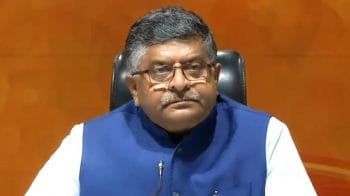Sources say Tata Sons have been approached to rescue Jet Airways
Jet Airways' lenders have worked out an alternate rescue plan for the debt-ridden airline that involves taking majority control and reconstituting the entire board of the country’s second largest carrier.
With just 11 days left to the end of this financial year, lenders are in a rush to seal a resolution plan. They have asked promoter Naresh Goyal to step down immediately and make way for a new management. As per the plan, Goyal's stake will likely be capped at 10 percent by diluting the rest at a nominal value.
"Nothing else is working out, so they (lenders) will take control and then once things stabilise, they will engage with the new investor," said a senior banking official, who did not wish to be named. "Any new investor will also be interested only when there is a change in management and stakeholders."
While there are talks of new investors including Tata Sons being approached, another source said it will take at least a couple of months to bring them in, as regulatory norms require due diligence on the part of the lenders too.
Tata Sons spokesperson was unreachable for comment. Questions sent to Jet Airways were not answered until the time of publishing this story. It will be updated once the companies respond.
Sources said SBI and Punjab National Bank, which have the highest exposure in the consortium, will get representation on the new board. The independent directors will be nominated by lenders. Jet Airways has a debt of Rs 8,200 crore to a consortium of 7-8 lenders, led by SBI.
Lenders wish to take full control of the airline before making any further investments. "The consortium will not run the airline but only hold majority stake as financial creditors, a position that will arise out of the restructuring. Essentially, there will be professionals to run the airline, lenders will only monitor the financials," the official said. "Lenders will get in a competent person, maybe for a short time and then look for a somebody capable for the long run because the new investor will also like to have a say in it," the official said.
On March 19, the consortium held a meeting to discuss the alternate plan after Etihad Airways CEO Tony Douglas, in his meeting with the SBI head a day ago, expressed the intent to exit the Indian airline. Etihad holds 24 percent stake in Jet Airways and is unwilling to bring in any more funds. The draft resolution plan required Etihad to invest Rs 750 crore as part of an emergency funding.
On March 20, SBI chief met with the Finance Minister Arun Jaitley and Aviation Secretary Pradeep Kharola to present the alternate resolution plan. "The government has given us no direction. We have taken a decision in commercial interest. The resolution plan is almost ready," SBI Chairman Rajnish Kumar told reporters in New Delhi. He said resolution under the Insolvency and Bankruptcy Code (IBC) was the last option as it will lead to grounding of the airline.
Jet is in a precarious condition, with just 35 of its 119 planes flying by the end of the week. Lessors have grounded most of the aircraft. Jet pilots and engineers have been paid for three months and about 1,000 flights have been cancelled. Jet pilots have threatened to go on strike if a solid resolution plan is not in place by March 31.
What do banking regulations say?
The resolution plan should be implemented within 180 days from the date of first repayment default, failing which large borrower accounts with exposure of Rs 2,000 crore and above will be referred to the IBC. Lenders are required to file the insolvency application under IBC within 15 days from the expiry of the timeline.
The account will be classified as a non-performing asset that attracts higher provisioning on the outstanding balance.
If there is restructuring or change in ownership implemented within the 180 days period, the account should not be in default at any point during the implementation of the resolution plan. To meet this criterion, at least 20 percent of the outstanding principal debt as per the plan and interest capitalisation should be repaid. Defaulting in this period will also trigger insolvency proceedings by lenders.
The norms also stipulate that the new promoter shall have acquired at least 26 percent of the paid up equity capital of the borrower entity and shall be the single largest shareholder of such an entity.



























































